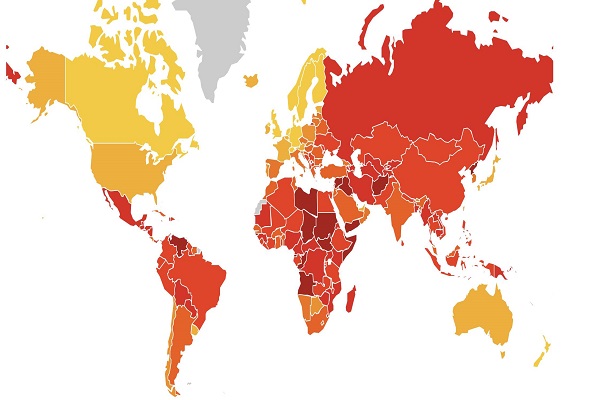According to the Corruption Perceptions Index 2018 of Transparency International (TI), released on Tuesday, the most corrupt countries in the Western Balkans are Albania, Macedonia and Kosovo, which are ranked 99th and 93rd respectively. They are followed by BiH and Serbia at 89th, and 87th, while Montenegro is at 67th and Croatia at 60th place.
TI has released an annual report on the Corruption Perceptions Index for 2018, which measures the level of corruption in public administration in 180 countries and territories around the world. The index was created on the basis of 13 surveys in the business sector, as well as expert assessments.
Special emphasis on this research is put on the link between corruption and the crises of democracy and the growth of right-wing and populist tendencies, especially within the European Union (EU) and other Western democracies.
According to the report, more than two-thirds of countries have an index indicating to an insufficiently effective fight against corruption. Most worrying is the fact that most countries did not make any or very little progress in the area of eradicating corruption, and it is estimated that only 20 countries have made a significant step in this regard.
The Western Balkans have the second-worst result in the index. Almost every country has made very limited progress in fighting corruption. The lack of political will, weakened institutions and the limitations of political rights have created an atmosphere in which corruption is booming, and there is very little will to fight it.
According to the TI report, only three countries in the Eastern European and Central Asian region have results above the average – Georgia ranked 41st, Montenegro 67th, and Belarus 70th. Combined with a lack of political will to fight corruption in the public sector, the states from both regions undermine the political rights of their citizens.
Montenegro compared to last year dropped by one percent and the country’s stagnation is evident. Despite progress in European integration, the state still needs to substantially improve the rule of law. Concerns are expressed regarding political party funding, as well as election financing.
Serbia dropped by two points compared to the previous year, and if the government continues to suppress the authorities and institutions responsible for maintaining the rule of law, the decline may continue, the report added.
Among the EU candidate countries and potential candidates, of those who have access negotiations, four out of seven record decline in the level of corruption perception compared to the previous year.
Kosovo has dropped by two points compared to the previous year. Some of the biggest anti-corruption challenges in Kosovo are insufficient transparency, weak institutions, rule of law and insufficient space for civic engagement.
Macedonia belongs to the monitoring group in the next few years together with Bosnia and Herzegovina, Turkey, Georgia, Ukraine and Armenia. Of the listed, only Armenia notices a positive trend, thanks to the change of government.





Comments are closed for this post.